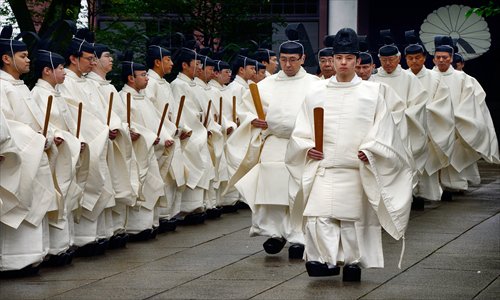Japanese cabinet members in visit to Yasukuni Shrine

Japanese Deputy Prime Minister Taro Aso visited the notorious war-linked Yasukuni Shrine Sunday evening while Prime Minister Shinzo Abe has dedicated equipment used in rituals amid the shrine's three-day spring festival, according to local media.
Abe, who will not visit the shrine during the festival out of consideration for the relationship with China and South Korea, offered a "masakaki" tree that is traditionally used in rituals to the shrine, with his name written under the title of "prime minister," according to Kyodo News Agency.
Earlier in the day, Keiji Furuya, chairman of the National Public Safety Commission, who is also state minister for disaster management and measures for national land strengthening, paid a visit to the shrine in his capacity as a cabinet member.
"It is natural for me as a parliament member to extend my sincere condolences to the spirits of the war dead who gave their lives for this country," Furuya said after his visit.
Deputy Chief Cabinet Secretary Katsunobu Kato also on Sunday made a personal visit to the shrine, which counts Japanese war criminals from World War II among those it honors, Kyodo reported.
On Saturday, Internal Affairs and Communications Minister Yoshitaka Shindo made a personal visit to the shrine, which will probably prompt more lawmakers to visit during the festival.
Repeated visits to the controversial shrine by Japanese leaders and lawmakers have become a major obstacle for Japan in mending its ties with neighboring China and South Korea, which suffered Japan's invasion in World War II.
China and South Korea have on several occasions urged Japanese leaders to stop visits to the shrine and take a responsible attitude toward history.
Abe visited the shrine last year in his capacity as opposition leader before he took office as prime minister in December.
During his first spell as premier in 2006-07, he stayed away from the shrine as he tried to mend ties with neighboring nations strained because of his predecessor Junichiro Koizumi's annual pilgrimage.
Abe on Saturday said Japan would like to provide necessary assistance during the rescue efforts of the deadly earthquake that hit Southwest China's Sichuan Province. Chinese foreign ministry spokesman Qin Gang said Sunday that China does not need help from abroad for the time being.
Agencies